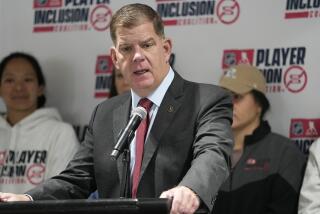A ‘Bleak Day’
- Share via
NEW YORK — The collective bargaining agreement between the NHL and its players’ association expired this morning, leading owners to lock players out of arenas and practice rinks on the eve of the first day of training camp for most of the league’s 30 teams.
It was an acrimonious end to a deal forged 10 years ago after a 103-day lockout cut the 1994-95 season to 48 games. The agreement was extended twice, but salary arbitration, lavish rookie bonuses and outsized free-agent spending by a handful of clubs sent salaries soaring at a pace that far outstripped revenues.
Commissioner Gary Bettman said Wednesday that he is not bound by a timetable to resolve this dispute, but added that he authorized teams to release arena dates they had reserved for games or practices over the next 30 days. The NHL season was scheduled to start on Oct. 13.
Bettman said the NHL could no longer operate with a labor structure that spawned losses of $497 million the last two seasons. He began planning for this more than five years ago, directing each club to contribute $10 million to a “war chest” to be used for operating expenses during the lockout.
Half of the NHL’s staff, about 100 people, will lose their jobs by Sept. 30; many clubs have laid off staff or reduced workers’ hours or pay to pare expenses.
Players’ salaries have jumped from an average of $733,000 in 1994-95 to $1.83 million last season. A league-commissioned study last year said teams devoted 76% of their revenue to player costs in 2002-03, a dangerous level for a league whose TV revenues brought each team about $6 million last season -- a pittance compared with the $82 million doled out to each NFL team. The NHL’s TV deal for this season was based on revenue sharing, with no upfront money.
“Unfortunately, we lose less money by not playing, and we know if we were to try to continue to play we would lose franchises and be in terrible, terrible shape,” an often emotional Bettman said after the Board of Governors voted unanimously to support a lockout. “We are out of gas.”
The last negotiations took place last Thursday, when the union offered to roll back players’ salaries 5%, reduce salaries for players in their first few NHL seasons, and accept a luxury tax designed to discourage extravagant spending. The tax money would be distributed among small-market teams, lifting them closer to equal footing with such rich rivals as the New York Rangers and Detroit Red Wings.
Of the four major team sports, the NHL alone does not have a salary cap or luxury tax. But the NHL rejected the luxury tax proposal last week as too weak to rein in spending and give the 20 clubs that lost money last season a chance to break even or become profitable.
“No one is more unhappy about this situation than I am,” Bettman said. “My pledge is we will correct this situation the right way. The game’s future depends on getting the right system.”
To him that means “cost certainty,” which he defined as “an enforceable and definable relationship between expenses and revenues so that a team’s ability to compete depends on its team-building skills, not its ability to pay.”
The union defines that as a salary cap, and it has rebuffed each proposal that linked salaries to revenues.
“We understand there are some issues, and that’s why we offered $100 million in givebacks,” said Trevor Linden of the Vancouver Canucks, president of the National Hockey League Players’ Assn. “We’ve already given up a lot of concessions. Players believe strongly that what we offered has the framework to work.”
Bettman and club executives derided the proposal as a rehashed version of one they rejected last year.
“It is sad the union could see this bleak day approaching and not lift a finger,” Bettman said. The NHLPA, he added, “is dug in. To use a hockey term, they’re instigating a fight. They think they can win this fight and they will get to keep the most [money]. They won’t, and time will tell that.”
Participants in the meeting were told not to speak to reporters, but those who did voiced a similar resolve.
“We’ve got some problems to solve, and we’re going to solve them,” said Bill Torrey, alternate governor of the Florida Panthers. “Any time hockey’s not played it’s sad for players, fans and the media, but it’s time for us to solve our problems.”
Said Jim Rutherford, general manager of the money-losing Carolina Hurricanes: “The present system doesn’t work for us. We need a new system. We’ll see how it plays out with the fans. I’m sure they’re frustrated. We’re all frustrated.”
No negotiations were scheduled as of late Wednesday. Bob Goodenow, the NHLPA’s executive director, said it would be a mistake for Bettman to try to break the union by declaring an impasse and unilaterally implementing new labor rules. “I think it’s a very ill-advised strategy,” Goodenow said. “It could be catastrophic.”
Bettman said he had no intention of doing so. “We’re hoping in the not-too-distant future the union and the league can get together and negotiate a partnership,” he said.
Said Linden: “It’s interesting that we’re supposed to enter into a partnership that starts with a lockout.”
The NHL has struggled for the widespread acceptance enjoyed by the NBA, NFL and Major League Baseball. Without a hockey season, the sport could be forgotten by fans in places where the sport hasn’t taken firm root, such as Carolina, Nashville and Phoenix.
“At the fan development level, no games is not good news because you are not offering the product they want. As a business interest it is something you have to risk because you can come out on the other end with a better model,” said Paul Swangard, managing director of the Warsaw Sports Marketing Center at the University of Oregon.
“The product is not set up for growth in its current form. It is idling under a misguided economic model, where any owner had the capacity to throw the entire market out of whack.”
Tony Tavares, former president of the Mighty Ducks and now president of baseball’s Montreal Expos, said a long lockout might result in attrition. However, Bettman said the league plans no contraction.
“I think unfortunately you would see some teams lost,” Tavares said. “I feel for people, for people that are losing money. Maybe some of these teams are in situations they don’t belong in.... This industry can’t afford to pay players $8 million. It was just a system that was doomed to failure. You could read the tea leaves and see it was coming. It was like two guys went to the gym and got buffed and they’re going to fight.”
Ron Salcer, a prominent agent who considered the union’s last proposal a viable foundation for a deal, sees little good coming out of the lockout.
“The effects could be devastating to some organizations and to hockey as we fight for the entertainment dollar,” he said.
“I’ve been preparing my clients. The sad part is players are ready for it. All of us deep in our hearts are hoping cooler heads will prevail.”
Times staff writers Mike Bresnahan and Chris Foster contributed to this report from Los Angeles.
*(BEGIN TEXT OF INFOBOX)
Called for icing
The NHL said Wednesday it was imposing a lockout of the players’ association, effective today -- the day after the expiration of the collective bargaining agreement:
* Key issue: The owners desire “cost certainty,” to have a direct connection between revenue and player costs. Owners say 75% of revenue is paid to players, a number the players’ association disputes; the NHLPA views “cost certainty” to be tantamount to a salary cap. That is a system the union says it will never accept, and one it says is the only solution the NHL will discuss.
* Negotiations: Last -- Sept. 9 in Toronto; Next -- none scheduled.
* Season schedule: Training camps were due to open today. Regular season scheduled to start Oct. 13.
* Last lockout: The 1994-95 season. It lasted 103 days and cut the regular
season to 48 games per team that were played solely within each conference.
* Last proposals: Owners, July 21, presented six concepts for a solution, but the players’ association said each contained the framework of a salary-cap system and rejected them all; union, Sept. 9, reworked proposal first offered in October 2003 that was based on four points: luxury tax, revenue sharing, a 5% rollback on all salaries, and changes to entry-level contracts. NHL Commissioner Gary Bettman said the sides were “not speaking the same language.”
Los Angeles Times and Associated Press
*
By the numbers
NHL lockout by the numbers:
* 2 -- Times NHL season has been previously interrupted because of labor conflict.
* 8 -- Work stoppages in baseball, the most among major team sports.
* 76 -- Percentage of team revenue owners say was paid out in player costs.
* 103 -- Days without hockey during lockout of 1994-95.
* $733,000 -- Average NHL player salary at time of 1994 lockout.
* $1,830,126 -- Average NHL player salary last season.
Associated Press
More to Read
Go beyond the scoreboard
Get the latest on L.A.'s teams in the daily Sports Report newsletter.
You may occasionally receive promotional content from the Los Angeles Times.







